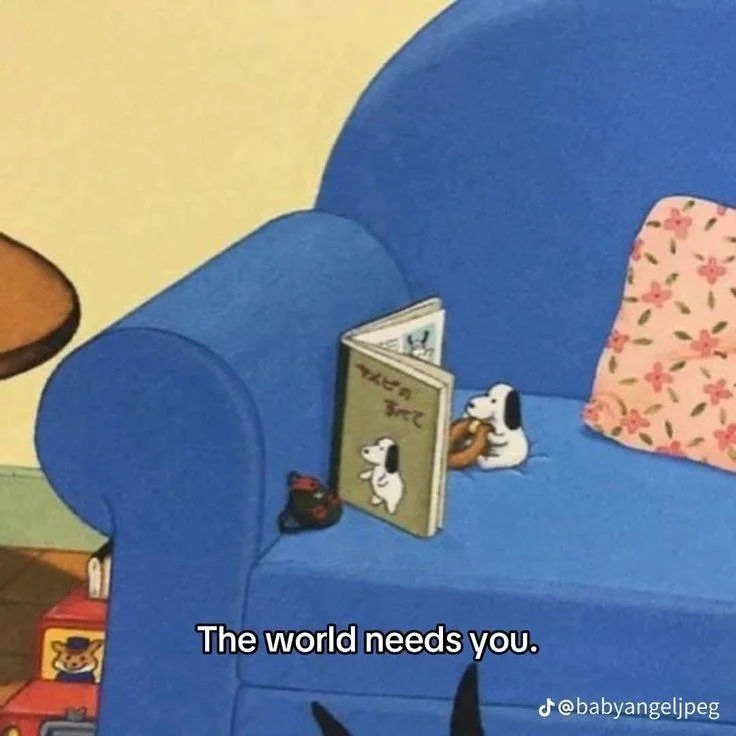from our newsletter, written by Linda Lin, RCC, CCC, RCAT
For a long time, I didn’t believe in the joy and ease of sharing my work.
To be real with you, I’ve been on the verge of stepping away and battling with my ideas and creativity ever since I started Decipher 5 years ago.
Choosing to recommit and act on my ideas again and again: stretching industry barriers around how a therapist ‘should’ show up, facing parts of myself I tend to avoid or reject, like money anxiety and asking for help, adapting to changes in our world, and considering the visibility of Decipher.
If you’re anything like me, maybe you’ve noticed how the journey back to our imagination can feel unsupportive and self-betraying at times. Just when we want to begin something new or return to something meaningful, instead of meeting ourselves with softness, we default to harshness. Like why are we getting so hard on ourselves for even trying?
How is it that the very moment we want to access our presence and power, judgement, pressure, control, fear show up?
So in this blog post, our mini research question is:
"Whose imagination are we living in?"
On a personal level, I think of this quote by Audre Lorde:
“In the cause of silence, each of us draws the face
of her own fear — fear of contempt, of censure, or
some judgment, or recognition, of challenge, of
annihilation. But most of all, I think, we fear the
visibility without which we cannot truly live.”
The fear of being seen shows up when we’ve learned to censor ourselves before anyone else gets the chance to. It shows up when the guarded protector part of me is activated. It doesn't pay attention to what actually nourishes me. It's what happens from living under harmful systems designed to cut us off from ourselves.
But facing the soul-crushing parts of the world asks something different of us. It calls us to slow down, to zoom out from the noise, to tune in to what really matters, and to show up with presence.
Those who monopolize resources, also monopolize our imagination
Let's just lay it out. I NEED you to pay attention to where your attention is going.
We have to get crystal clear and pursue dreaming and building on our imagination.
We need to deprogram from the capitalism and the AI-chokehold it has on our psyche, voice and art.
There's a quote by a sociologist, thinker, African American scholar, Dr. Ruha Benjamin in her book Imagination: A Manifesto where she writes, “those who monopolize resources also monopolize imagination”. How is it that we can imagine a world where we can colonize another planet and fly over to get brunch, or design babies based on epigenetics or have AI systems that simulate people who have already passed away, but we can't imagine a world where no child is hungry or where violence is not a thing, where we are rooted in abundance and ease (instead productivity and urgency).
This is a reminder to myself, and to anyone who needs to hear this:
💙 Let go of the pressure to be polished all the time in our craft.
💙 Share your thoughts with people, even when they’re messy or unfinished.
💙 Connect even in virtual spaces where we bring in quirks into our art, random edits, going off-script, with pauses, where something real breaks through instead of reading paragraphs with em dashes everywhere IYKYK.
💙 There’s something powerful in expressing ideas just from our imagination, not ones from Big Tech!
Every time you share your sensitivities, ideas and imagination, they connect us and humanize us.
I really want you to know that your perspectives and ideas are worth exploring and it would be such an honour for the world to hear and witness them ❤️
When we show up as we are, we give others permission to do the same too!
Somehow from 5 years of fearing visibility, I’m still showing up at Decipher, writing these monthly-ish newsletters, growing a community to co-create visions into existence!
Happy 5 years to this amazing community and everyone who’s stopped by or keeps coming back. I’m really grateful for all of you who make this space feel alive and full of possibility. Here’s to many more years of healing and dreaming together!












![DreamLab : An Art Therapy Experience [CICA x Decipher] SOLD OUT](https://images.squarespace-cdn.com/content/v1/5ae7f1bb266c07f90cfec5be/1747897613136-J8K1WA19NILXNDNI7LP8/Decipher+Postcard+%282%29.png)


